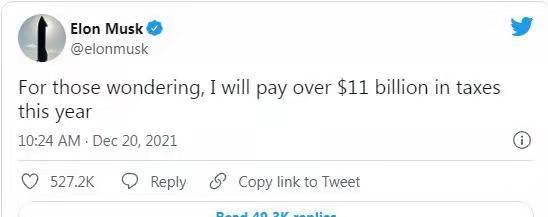Recently, SpaceX CEO Elon Musk tweeted that he will pay $11 billion in taxes to the US authorities in 2021. This huge amount of money will set a record for the highest annual personal tax payment in the History of the United States.

Accused of not paying taxes!
ProPublica revealed in a report that the top 25 richest people in the United States increased their wealth value by a total of $401 billion from 2014 to 2018, but only paid $13.6 billion in federal income tax, with an effective tax rate of only 3.4%. However, for middle-class households in the United States, the federal income tax rate is 14%, and the tax rate on the highest bracket of household income is as high as 37%.
From 2014 to 2018, SpaceX's Musk's real wealth grew by $13.9 billion, paying only $455 million in taxes, with an effective tax rate of 3.27%, and in 2018, he didn't pay even a penny in taxes.
The U.S. senator asked to investigate allegations disclosed in proPublica's report about financial institutions and their role in tax avoidance, noting that tax avoidance by the wealthiest individuals in the United States is grossly unfair, leaving the government unable to make critical investments in infrastructure, education, and health care.
Why pay such a tax?
Why Musk has made such a big fuss about telling the public that he is going to pay $11 billion in taxes is mainly due to the personal income he obtained as a TESLA CEO that has expired and needs to be exercised.
Back in 2012, Tesla granted Musk 25.5 million stock options, and in the years that followed, Musk received 22.9 million of those options. Under the deal, he could choose to buy Tesla stock for $6.24 at any time in the next 10 years. In November 2021, Musk initiated the exercise process, buying 22.9 million shares at the exercise price and selling 10.3 million of them to pay the tax required to exercise the option.
Musk earned about $23.5 billion by exercising options, the difference between the price at which 22.9 million stocks exercised minus the stock exercise price. These gains will be taxed as general income, with the applicable federal tax rate of approximately 40.8 percent (the highest tax rate for U.S. personal income tax is 37 percent, plus investment income tax of 3.8 percent).
As a result, Musk has to pay about $9.5 billion in taxes. Since most of these options were acquired by Musk when he was a California tax resident, he would also have to pay California income tax at a top rate of 13.3 percent.
In addition, in early November 2021, Musk sold an additional 5.4 million shares held in trust. The shares are likely to have been held by the company since its initial public offering in 2010, and the sales proceeds will be taxed as long-term capital gains, subject to a 20% tax rate, with a tax of approximately $1.2 billion.
As a result, Musk will have to pay $10.7 billion in federal taxes in 2021, and with the tax revenues that the state government needs to collect, the amount of taxes it will pay for the whole year will exceed $11 billion.
Why choose to pay your taxes now?
It is said that Musk has 10 years to choose to exercise, why choose now? In simple terms, there are three reasons:
1. Expired, had to exercise the right
Tesla granted Musk stock options in 2012, and soon the 10-year term will come, and these options will expire in August 2022. According to the agreement, Musk needs to move forward at this time.
2. Overrated? Cash out at a high point
When Musk exercised his rights, Tesla's stock price was about $1,000 per share, which was 10 times that of 3 years ago, and the price-earnings ratio was more than 300 times, and the valuation was very high.
3. The new us law, the tax burden is about to rise
On November 20, 2021, the Building Back Better bill in the United States was voted through. The bill supports a $1.75 trillion package of social spending, largely from tax increases on high-net-worth individuals and businesses.
The bill proposes that high-income individuals should be subject to an additional tax rate of 5% for individuals with an annual income of more than $10 million and an additional tax rate of 8% for individuals with an annual income of more than $25 million. At the moment, it seems unlikely that the bill will become law, but the possibility of passing the bill has an impact on Musk's decision-making when musk sets out his stock trading plan. It means that Musk may face a heavier tax burden if he exercises his options again by 2022.
Therefore, Musk's choice to exercise power at this time can be regarded as a means of considerable cost performance.